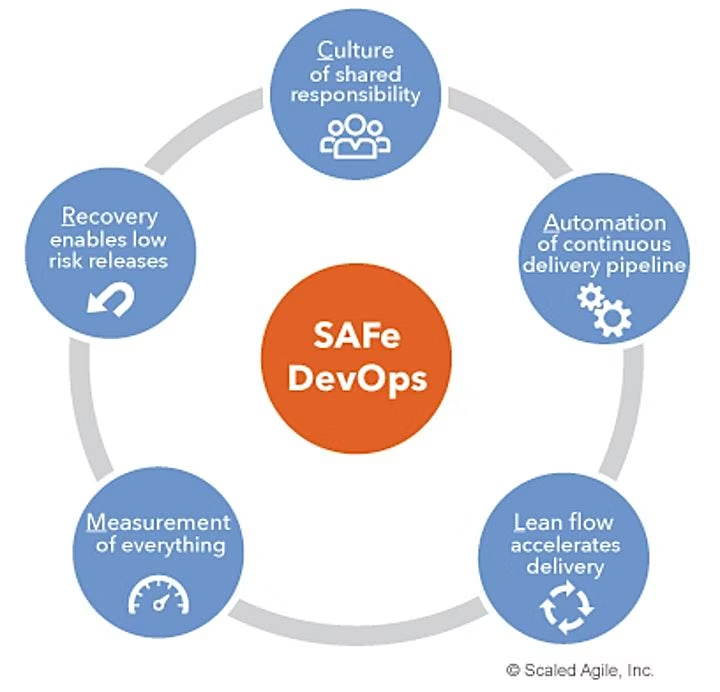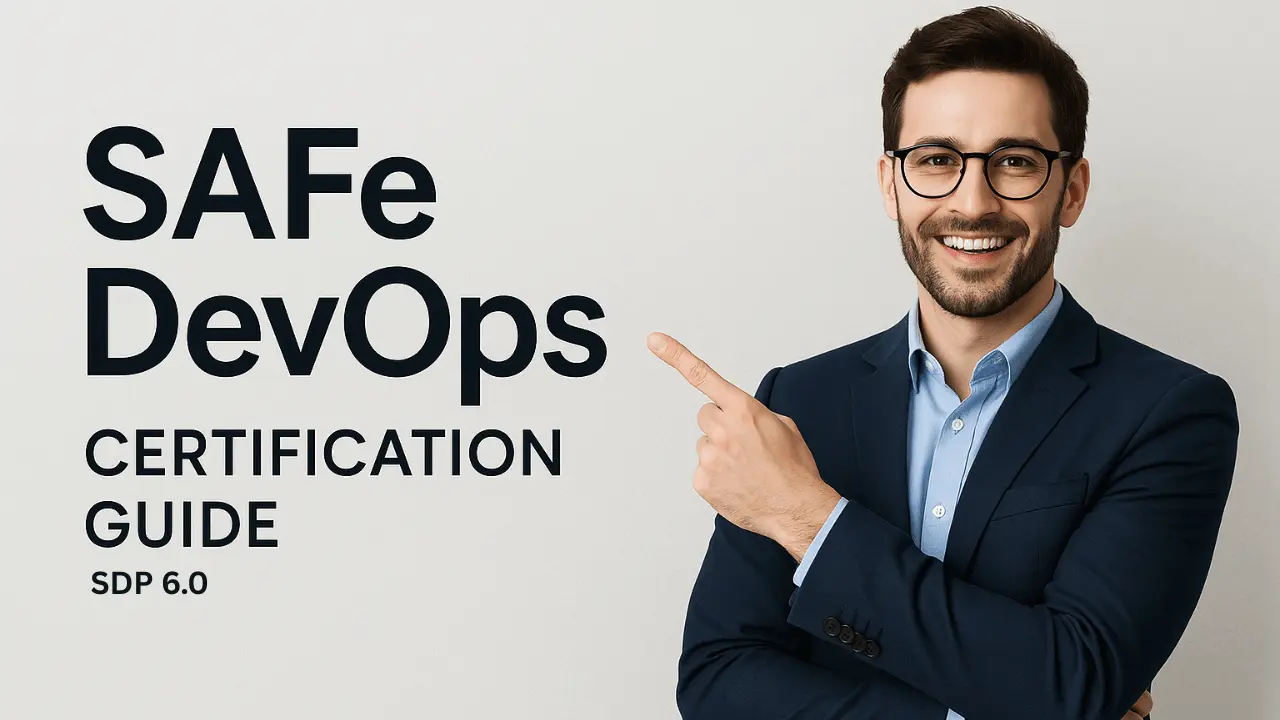In today’s rapidly evolving Agile and DevOps landscape, the SAFe DevOps certification stands out as a pivotal credential for professionals aiming to bridge the gap between development and operations within large-scale enterprises. This guide delves into the intricacies of the certification, from understanding its framework to navigating the training, examination, and renewal processes.
What is SAFe DevOps?
SAFe DevOps integrates DevOps practices into the Scaled Agile Framework (SAFe), promoting a culture of collaboration between development and operations teams. This integration ensures faster and more reliable delivery of value to customers. Central to this approach is the SAFe DevOps mindset, which emphasizes shared responsibilities, continuous improvement, and seamless communication across all stakeholders.
Key Components of the SAFe DevOps Framework
The SAFe DevOps framework encompasses several critical elements that collectively enhance the software delivery lifecycle:
| Component | Description |
|---|---|
| Continuous Delivery Pipeline | A set of workflows that ensure continuous delivery of software from concept to release. |
| DevOps Health Radar | A diagnostic tool to measure current DevOps performance across dimensions. |
| Value Stream Mapping (SAFe) | A visual tool for analyzing and optimizing flow in the development process. |
| SAFe Studio | A platform that provides tools, community access, and resources for SAFe learners. |
By leveraging tools like the DevOps Health Radar and practices such as Value Stream Mapping, organizations can identify bottlenecks, streamline processes, and enhance overall efficiency.
Benefits of SAFe DevOps Certification
Earning the SAFe DevOps certification offers numerous advantages:
- Enhanced Collaboration: Fosters a unified approach between development and operations teams.
- Improved Efficiency: Streamlines processes, reducing time-to-market.
- Career Advancement: Recognized globally, it opens doors to advanced roles in Agile and DevOps environments.
- Access to Resources: Provides entry to SAFe Studio, offering a wealth of tools and community support.
SAFe DevOps Training and Course Options
Several reputable organizations offer SAFe DevOps training, catering to diverse learning preferences:
| Provider | Features | Format |
|---|---|---|
| PDF Questions | Official provider with access to SAFe questions. | Downloadable |
| ScrumDumps Online Practice | Comprehensive online practice tests | Online |
These courses typically encompass:
- Two-day instructor-led sessions.
- Access to online practice tests for exam preparation and tools.
- Comprehensive study materials and course workbooks.
- Certification exam like access.
For those seeking flexibility, SAFe DevOps online courses provide the convenience of remote learning without compromising on quality.
SAFe DevOps Exam Overview
Candidates must pass the SAFe DevOps exam to attain certification. The SAFe DevOps exam format usually includes multiple-choice questions that test knowledge of DevOps principles, continuous delivery, automation, and collaboration in the SAFe framework. The exam evaluates the candidate’s understanding of implementing DevOps practices to improve flow and quality in Agile Release Trains.
| Attribute | Details |
|---|---|
| Exam Format | 45 multiple-choice questions. |
| Duration | 90 minutes. |
| Passing Score | 73% (33 correct answers). |
| Delivery | Web-based, closed book. |
| Language | English. |

Preparation Tips:
- Utilize a SAFe DevOps exam guide.
- Engage in multiple SAFe DevOps practice tests.
- Review SAFe DevOps assessment tools.
Platforms like ScrumDumps offer curated resources, including safe 6 devops exam questions, to aid in effective preparation.
Certification Cost and Renewal
Understanding the financial aspects is crucial:
| Item | Cost |
|---|---|
| Training + First Exam Attempt | $800–$1000 (varies by provider). |
| Retake Fee | $50 per attempt. |
| Annual Renewal Fee | $100. |
Retake Policy:
| Attempt | Waiting Period |
|---|---|
| 2nd Attempt | Immediate. |
| 3rd Attempt | 10 days. |
| 4th Attempt | 30 days. |
For updated pricing, promo codes, and exam retake tips, visit ScrumDumps.
SAFe DevOps vs. Other DevOps Certifications
Choosing the right certification depends on your career goals:
| Certification | Focus Area | Ideal For |
|---|---|---|
| SAFe DevOps | DevOps in scaled Agile environments. | Enterprise Agile & DevOps professionals. |
| AWS DevOps Certification | Cloud-based DevOps practices. | Cloud engineers and architects. |
| Azure DevOps Certification | Microsoft DevOps ecosystem. | Azure-based project teams. |
| Kubernetes & DevOps (CKA/CKAD) | Containerization & automation. | Platform & infrastructure engineers. |
| General DevOps Certification Online | Broad DevOps practices. | Beginners and intermediate learners. |
While SAFe DevOps Practitioner (SDP) 6.0 is tailored for large-scale Agile implementations, certifications like AWS DevOps and Azure DevOps focus more on specific cloud platforms.
Is SAFe-DevOps Certification Right for You?
If you’re involved in large-scale Agile projects or aim to enhance collaboration between development and operations teams, the SAFe DevOps Practitioner (SDP) 6.0 certification is a valuable asset. It not only validates your expertise but also equips you with the tools to drive continuous improvement in your organization.
Conclusion
In 2025, the demand for professionals adept in both Agile and DevOps practices continues to surge. The SAFe DevOps certification offers a structured pathway to acquire and validate these skills, positioning you at the forefront of enterprise-level software delivery.
For comprehensive resources, including SAFe DevOps exam guides, practice tests, and exclusive study bundles, visit ScrumDumps—your trusted partner in SAFe DevOps practitioner course and training.
FAQs
Absolutely. It enhances your credentials, showcasing your ability to implement DevOps practices within a scaled Agile framework
The total cost, including training and the first exam attempt, typically ranges between $800 and $1000
SAFe in DevOps refers to the integration of DevOps practices within the Scaled Agile Framework, promoting seamless collaboration and continuous delivery.
It depends on your career goals. For enterprise Agile environments, SAFe DevOps is ideal. For cloud-specific roles, consider AWS DevOps or Azure DevOps certifications.

